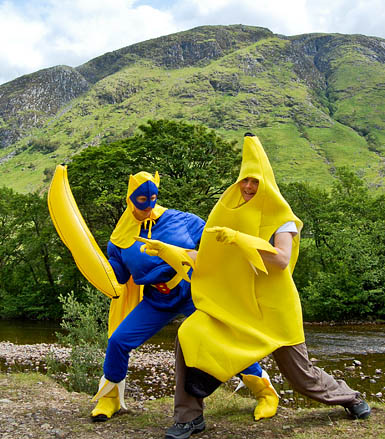Litterbug walkers are driving staff bananas on Britain’s highest mountain.
Officers from the John Muir Trust, which owns most of Ben Nevis, are dressing up to raise awareness of the problem of dropped litter, including banana skins, which have a marked impact on the hill’s fragile environment.
Litter is a big problem on Ben Nevis; the most recent clean up by volunteers produced 18 sacks of rubbish. Organic waste has a large effect and 10 of the bags were full of banana skins.
So conservation officer Sarah Lewis is dressing as Bananaman and a colleague is donning a banana suit to get across the serious message to walkers on the 1,344m (4,409ft) peak.
Ms Lewis said: “We’ve been talking to walkers going up the hill about the effect that organic litter can have on the environment.
“There’s been a great response to the costumes so far. Hopefully they’ll make the message stick in people’s mind.
“A lot of people who wouldn’t normally dream of dropping litter don’t realise that things like banana skins and apple peel are creating a big problem for the local environment. We want people to take the ‘leave no trace’ approach, which means if you carry something up the hill, you should take it back down with you.”
Many visitors mistakenly feel it is acceptable to throw away fruit waste because it will decompose naturally, but the arctic-type environment on the mountain is being affected.
Ms Lewis added: “Bananas have a lot of potassium in their skins which can change the soil composition.
“They have a hard time biodegrading in rocky and cold upland environments and can take up to two years to fully decompose. Scavengers such as herring gulls and crows are doing better on the summit plateau and other litter hotspots than they would naturally solely because of the amount of edible rubbish that gets left. These species are displacing native birds such as snow bunting and ptarmigan.”
John Muir Trust is warning walkers not to be alarmed if they spot the bright-yellow human sized apparitions on the mountain, as the campaign will continue throughout the summer, but said staff said visitors should watch out for the real thing discarded in the wrong place.

John Manning
06 July 2011Great that the JMT is bringing this to the outdoor world's attention.
My partner Steph and I recently cleared around 50 'nana skins off the summit of Pen y Ghent in the Dales, along with a rucksack full of discarded plastic bottles. As I collected them, people gave me curious looks, as if I was the one behaving suspiciously…
If you go to Humphrey Bottom on Ingleborough, you'll see where rotted skins have turned the peaty soil around the wall bottom into a black, oozy gloop.
Banana skins, like plastic bottles, are litter. They're alien to our landscape.
The good news is that an empty banana skin weighs less than a full banana and as such is easier to take home with you for proper composting or disposal, along with the rest of your litter.
Richard Warren
06 July 2011I think that this is an excellent initiative by JMT - we have similar problems in the Lake District and specifically from most probably three peakers on Scafell Pike (it is easier to discard litter at 3.00 a.m. when there is no one around) - see recent grough article on rubbish on the pike.
Perhaps the local trust should do something similar as should those who have a keen interest in Snowdon (similarly suffering).
I do have an idea for Scafell Pike litter louts but unfortunately it cannot be enforced.....well not legally)
We will just need to keep banging out the message 'Climb the Pike but leave no trace'
Rory@JohnMuirTrust
06 July 2011Good comments John and Richard, It's been interesting talking directly to walkers about litter on the Ben. Most people seem to bring down what they take up, but the problem with bananas in particular is that there's a perception they will simply biodegrade with no impact.
One person we spoke to at the weekend thought because Snowdon was covered in skins that dropping them was the right thing to do! This unintentional littering is something we can only address through educating people about the issues.
Our staff are there at busy weekends so we've spoken to quite a few people doing the Three Peaks. Again, we need to stress that most of the people taking part don't intentionally litter, but hopefully if we can get this message across at Nevis then the other peaks will feel the benefit.
Toni
13 July 2011Here we have a different problem. http://www.heraldnet.com/article/20110709/NEWS03/707099932 Urinating near trails turns them into a long linear salt lick that attracts wild goats.